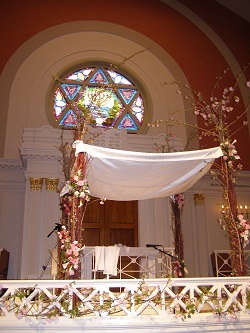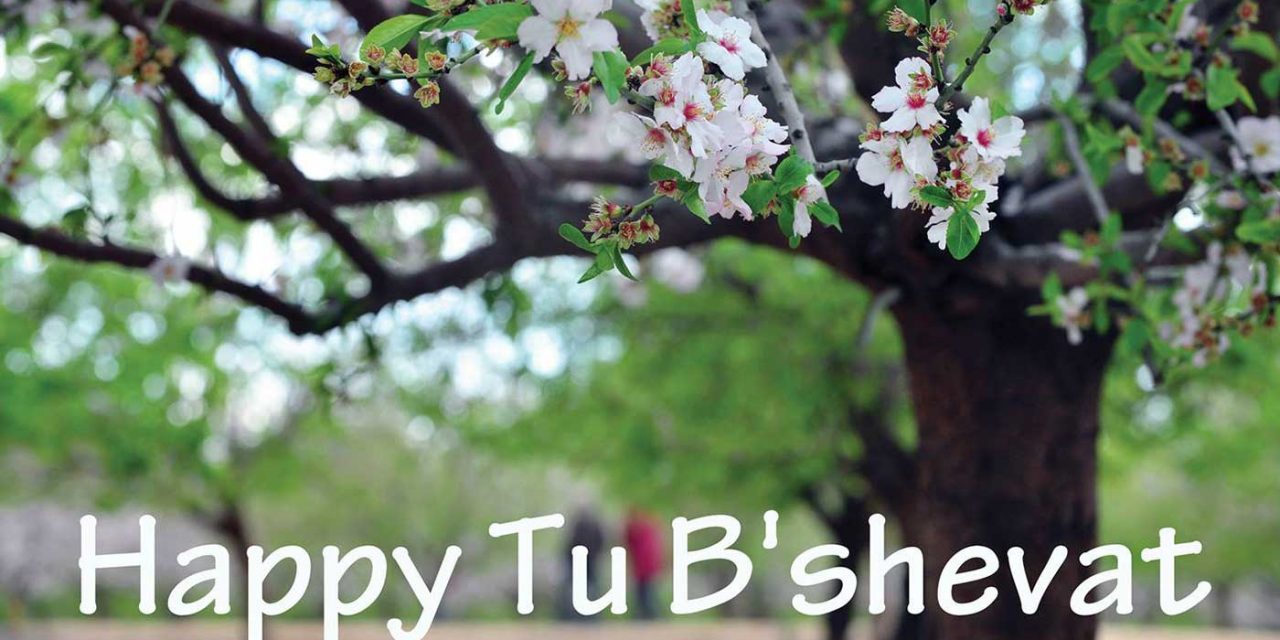Many Christians are unaware of the Jewish holiday of Tu B’Shevat, the New Year for Trees. At first it appears a slightly odd thing to celebrate, but as we look into this holiday we discover the deep Biblical teaching.
Like Hanukkah, Tu B’Shevat is not mentioned in the Bible. It has, however, been part of Jewish custom for centuries. In recent times Tu B’Shevat has become known as an “environmental holiday”, a Jewish “earth day” where people plant trees. While it may be noble to plant trees and to look after God’s creation, Tu B’Shevat actually has nothing to do with these things. So what is it all about?
Tu B’Shevat in the Natural – the New Year for Trees
Tu B’Shevat is called the New Year for Trees because this is the time when the trees of Israel come back to life after their winter hibernation.
The winter rains have come to an end and the water has drained beneath the earth’s surface, down to where the roots dwell. There is little to no rain in the summer months, so their sustenance comes from these deep reservoirs of water that are now nourishing the roots. The ground “wakes up”, the roots start to drink and the trees “come back to life” on Tu B’Shevat.
“For he shall be as a tree planted by the waters, and that spreadeth out her roots by the river, and shall not see when heat cometh, but her leaf shall be green; and shall not be careful in the year of drought, neither shall cease from yielding fruit.” – Jeremiah 17:8
Trees in Israel fulfil Bible prophecy
Trees are an important part of life in Israel. Trees are planted to remember people, they are planted to celebrate births and are planted simply to bless the land of Israel as God commanded.
The Bible teaches how the land of Israel will flourish when the Jews return. This is happening today. Israel is one of only two countries in the world that entered the millennium with an increase of trees. These numbers continue to grow and the Biblical prophecy is being fulfilled in our time.
Marriage and Trees

OLYMPUS DIGITAL CAMERA
There is an ancient Jewish custom to plant a tree every time a child is born. Males typically would have a cedar tree planted and females a cypress tree. The hope was that the girls will be hopeful and fragrant like the cypress tree and the boys will grow into strong men.
In a beautiful tradition, when a bride and groom join together in marriage, they each provide branches from their trees to make a chuppah, the canopy under which Jewish couples get married. The couple are wed under the branches of their personal trees to represent the bond between birth and marriage.
The Biblical teaching about trees
The Bible constantly refers to humans as being like trees. Psalm 1:3, Jeremiah 17:8 and Psalm 19:12 to name just a few. As with trees, the most important thing about people is the fruit they bear. Are they productive, do they develop their talents, are they a blessing to others, etc?
“And he shall be like a tree planted by the rivers of water, that bringeth forth his fruit in his season; his leaf also shall not wither; and whatsoever he doeth shall prosper.” – Psalm 1:3
Tu B’Shevat is all about fruit
While trees are important, however, the real purpose of a tree is to produce fruit. And so, as stated earlier, the celebration is not actually about trees but about the fruit they produce. It is fruit that is the symbol of Tu B’Shevat.
Jews celebrate Tu B’Shevat by eating fruit. There are various thoughts on the number of fruits that should be eaten during the holiday, from seven to fifteen, but the popular thought is that it is based upon the fruit Israel is best known for today, which is also the fruit mentioned in Deuteronomy 8:8 – figs, olives, grapes, figs and pomegranates, dates (honey).
As Christians we can see the significance of the Old Testament comparisons to trees and humans, but also with the fruit of the spirit: love, joy, peace, patience, kindness, goodness, faithfulness, gentleness and self-control.
Fruit represents the good things in life
Nutritionally, fruits are important to good health, however, they are not essential to our survival. Humans are much more dependent on carbohydrates, proteins and the nutrients from vegetables than they are on fruit. In other words, we don’t need fruit to live. However, food would be boring if we didn’t add the sweetness of fruit to our diet.
The same goes for humans bearing fruit. People can survive living by themselves, for themselves and without contributing in a meaningful way in other people’s lives, but they do not flourish by doing that.
This is the same for the Jewish feasts. The other holidays of Judaism are commanded or have significant events attached to them. Those holidays are the protein and carbohydrates of Judaism and are essential to Jewish person’s spiritual growth. Tu B’Shevat, quite literally, is the fruit on top to add sweetness.
The teachings of Tu B’Shevat also reflect this. The Jewish people take time to enjoy the goodness of life. God wants us to spend time enjoying the sweet things. His teachings also teach us to pursue what is good.
We see this in the natural when Israel strives to reach new levels of excellence, whether it be in tech, agriculture or anything else for that matter. They grow, flourish and produce what is good. This desire is no doubt fuelled by the Jewish teachings similar to that of Tu B’Shevat.
Thanking God for the Land of Israel and Tu B’Shevat
Like with all Jewish holidays, Tu B’Shevat also has a significant connection with Israel.
The only time the Jewish people are commanded in the Torah to audibly thank God for the land of Israel is when they harvest fruit for the first time in a year. Therefore, Tu B’Shevat, the holiday for the fruit, has a significant importance to Israel, because it marks the start of fruit harvest and the time when cries go out to God to thank Him for the land of Israel.
It is wonderful to think that Jewish farmers pick fruit while giving thanks to God for the land He has given them. This praise to God is the “fruit of their lips” to their heavenly father for the fruit of His land.
The importance of tithing and Tu B’Shevat
Tu B’Shevat is closely linked to tithing in Jewish tradition. Jews were traditionally required to tithe from the crops of each harvest year. The new harvest year begins on Tu B’Shevat. Any fruit that blossoms before Tu B’Shevat is part of the harvest and tithe for the previous year and any fruit that blossoms after Tu B’Shevat is part of the new year’s harvest and tithe.
It is quite interesting too that during January/February, the time when Tu B’Shevat falls each year, it is usually time when Christians have a First Fruits Offering in their church. While this connection may be subconscious for many Christians, it is good to see a link between the Jewish traditions, the seasons of Israel and our Christian traditions.
The Biblical significance of the Almond Tree
The almond tree is the first tree to blossom in Israel and if you visit Israel at this time of year you will start to see their flowers bloom. This is why when God uses the almond tree in the Bible it represents swiftness.
One example of this is In Jeremiah 1:11-13, where God shows Jeremiah the prophecy of impending doom upon Israel. Jeremiah sees visions of an almond tree branch and another of a boiling pot, which represents God’s anger. Then God’s explains to Jeremiah that His judgement is coming quickly.
Another example of the almond blossom is in Number 17 when God causes Aaron’s rod to bloom and produce whole almonds in a single night to show that He has chosen Aaron and his sons to be High Priests of Israel.
Tu B’Shevat represents a new spiritual season
During the winter months there is only Hanukkah as a Jewish holiday, which doesn’t have any Biblical connection. However, when spring arrives in Israel, on Tu B’Shevat, renewal is in the air.
Starting with Tu B’Shevat a Jewish holiday occurs on the 15th of the month (in the Jewish calendar).
15th day of Shevat = Tu B’Shevat
15th day of Adar = Purim
15th day of Nisan = Pesach
15th day of Iyar = Pesach Sheni
This season of 15th day holidays finishes with Shavuot breaking the cycle.
Conclusion
So there we have it, Tu B’Shevat is the start of a new season and it teaches us to thank God for Israel and celebrate the sweet things in life.










